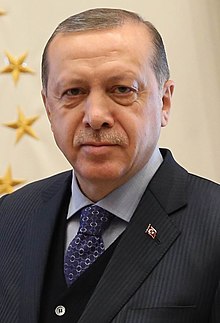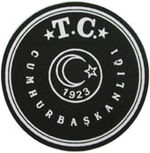President of Turkey
| President of the Republic of Turkey Türkiye Cumhuriyeti Cumhurbaşkanı | |
|---|---|
 Presidential Seal | |
 Presidential Standard | |
 Incumbent Recep Tayyip Erdoğan since 28 August 2014 | |
| Status | Head of state Head of government (both since 2018) |
| Residence | Çankaya Mansion (since 1923) Presidential Complex (since 2014) |
| Term length | Five years, renewable once |
| Inaugural holder | Mustafa Kemal Atatürk |
| Formation | 29 October 1923 |
| Deputy | Vice President of Turkey |
| Salary | ~€150,000, annual[1][2] |
| Website | https://www.tccb.gov.tr/ |
Turkey |
|---|
 |
This article is part of a series on the politics and government of Turkey |
Constitution
|
Legislature
|
Executive
|
Judiciary
|
Elections
|
Foreign relations
|
See also
|
|
The President of the Republic of Turkey (Turkish: Türkiye Cumhuriyeti Cumhurbaşkanı) is the head of state and head of government of the Republic of Turkey. Following the 2018 general election, the incumbent office-holder assumed the role of an Executive President and holds both ceremonial and executive status. In this capacity, the President represents the Republic of Turkey, and the unity of the Turkish nation, as well as ensuring the implementation of the Constitution of Turkey and the organized and harmonious functioning of the organs of state. The articles from 101 to 106 of the Constitution establish all the requirements, election, duties, and responsibilities for the office of the President. The office of the President of Turkey was established with the proclamation of the Republic of Turkey on 29 October 1923. The President of Turkey is often referred to as the Cumhurbaşkanı, meaning 'President of the People'.[3][4]
Often since 1950, the presidency has been a mostly ceremonial office. However, in a 2017 referendum, the Turkish people narrowly voted to make the presidency an executive post, effective with the 2018 general election.
The current office-holder is Recep Tayyip Erdoğan, who has held the office since 28 August 2014. Since 9 July 2018, Erdoğan has served as the first Executive President, with increased legislative and judicial powers.
Contents
1 Qualifications
2 Election
3 Term of office
4 Duties and responsibilities
4.1 Legislative functions
4.2 Executive functions
4.3 Judiciary functions
5 Accountability and non-accountability
6 Acting President
7 Living former Presidents
8 See also
9 References
10 External links
Qualifications
In order to become the President of Turkey, the candidate must have completed higher education, and be of at least forty years of age. If they are a member of the Turkish Grand National Assembly, they must resign their seat.
In the past, Turkish presidents were required to sever all relations, if any, with their political party.[5]
Election
The election of the President must begin at least 30 days before the term of office of the incumbent president expires or 10 days after the presidency falls vacant, and must be completed within 30 days of the beginning of the election. Candidates must be declared to the bureau of the parliament within the first 10 days of this period, and elections must be completed within the remaining 20 days.
Formerly, the President was elected by the members of the Turkish Parliament. According to an amendment that was drafted in 2007, the future Presidents shall be elected by the citizens through a public vote. The candidates must be at least forty years old and must have completed higher education. They can either be members of the Turkish Parliament, or members of the public who fulfill these requirements and who are eligible to become members of parliament.
Term of office

President Recep Tayyip Erdoğan during a meeting, with the presidential seal and Turkish flag
The President is selected for a term of office of five years, and is eligible for re-election .
The term of office of the incumbent president continues until the President-elect takes office.
On assuming office, the president takes the following oath before the parliament:
I swear upon my honour and integrity, before the great Turkish Nation, to safeguard the existence and independence of the state, the indivisible integrity of the country and the nation, and the absolute sovereignty of the nation; to remain loyal to the supremacy of law, to the democratic and secular republic, and to Atatürk’s principles and reforms; not to deviate from the ideal according to which everyone is entitled to enjoy human rights and fundamental freedoms under the notion of peace and prosperity in society, national solidarity and justice, and loyalty to the Constitution.[6]
The oath is broadcast live on TBMM-TV regardless of it is a regular business day of TBMM.
Duties and responsibilities
Legislative functions
- to deliver, if he deems it necessary, the opening address of the parliament on the first day of the legislative year,
- to summon the parliament to meet, when necessary,
- to promulgate laws,
- to return laws to the parliament to be reconsidered,
- to submit to referendum, if he deems it necessary, legislation regarding amendment of the constitution,
- to appeal to the Constitutional Court for the annulment of certain provisions or the entirety of laws, decrees having the force of law, and the Rules of Procedure of the parliament on the grounds that they are unconstitutional in form or in content,
- to call new elections for the parliament and presidency
- to deliver budget to TBMM Budget Commission
Executive functions
- to appoint and dismiss ministers
- to appoint vice president
- to accredit representatives of the Turkish State to foreign states, and to receive the representatives of foreign states appointed to the Republic of Turkey,
- to ratify and promulgate international treaties,
- to represent the Supreme Military Command of the Turkish Armed Forces on behalf of the Turkish Grand National Assembly,
- to decide on the mobilization of the Turkish Armed Forces,
- to appoint the Chief of the General Staff,
- to call the National Security Council to meet,
- to preside over the National Security Council,
- to proclaim state of emergency, and send to TBMM to get parliamentary approval, in state of emergency every decree president issues will need parliamentary approval
- to sign executive decrees,
- to appoint the members and the chairman of the State Supervisory Council,
- to instruct the State Supervisory Council to carry out inquiries, investigations and inspections,
Judiciary functions
- to appoint the members of the Constitutional Court, one-fourth of the members of the Council of State, the Chief Public Prosecutor and the Deputy Chief Public Prosecutor of the Higher Court of Appeals, the members of the Military High Court of Appeals, the members of the Supreme Military Administrative Court and the members of the Supreme Council of Judges and Public Prosecutors.
The president performs also the duties of selection and appointment, and other duties conferred by the constitution and laws.
Accountability and non-accountability
All presidential decrees, except those which the president is empowered to enact on his own, must be signed by the prime minister and the minister concerned, in accordance with the provisions of the constitution and other laws. Thus the prime minister and the concerned ministers are accountable for these decrees. The decisions and orders signed by the president on his own initiatives may not be appealed against to any judicial authority, including the Constitutional Court. The president may be impeached for high treason on the proposal of at least one-third of the total number of the members of the parliament, and by the decision of at least three-fourths of the total number of the members.
Acting President

The official Seal of the Presidency, used on documents.
In the event of a temporary absence of the President on account of illness, travel abroad or similar circumstances, the Vice President of Turkey serves as Acting President, and exercises the powers of the President until the Presidents comes back. If the Presidents resigns or dies, the TBMM Speaker serves as Acting President, and exercises the powers of the President until the new election happens in 45 days.
Living former Presidents
There are two living former Turkish Presidents:

Ahmet Necdet Sezer
(2000–2007)
(1941-09-13) September 13, 1941
Abdullah Gül
(2007–2014)
(1950-10-29) October 29, 1950
See also
- Air transports of heads of state and government
- Official state car
Presidential Palace, Ankara – new presidential palace compound of the Republic of Turkey- List of Presidents of Turkey
- Presidential Guard Regiment
References
^ https://www.egypttoday.com/Article/1/39081/Erdoğan’s-salary-11K-Turkish-foreign-debt-438B
^ https://xe.com/currencyconverter/convert/?Amount=780000&From=TRY&To=EUR
^ http://www.nedirnedemek.com/reisicumhur-nedir-reisicumhur-ne-demek
^ http://www.tdk.gov.tr/index.php?option=com_gts&arama=gts&kelime=cumhurbaşkanı&guid=TDK.GTS.511fbdf0949d06.48464753
^ Shaheen, Kareem (2017-05-02). "Erdoğan rejoins Turkey's ruling party in wake of referendum on new powers". The Guardian. ISSN 0261-3077. Retrieved 2017-05-03..mw-parser-output cite.citation{font-style:inherit}.mw-parser-output .citation q{quotes:"""""""'""'"}.mw-parser-output .citation .cs1-lock-free a{background:url("//upload.wikimedia.org/wikipedia/commons/thumb/6/65/Lock-green.svg/9px-Lock-green.svg.png")no-repeat;background-position:right .1em center}.mw-parser-output .citation .cs1-lock-limited a,.mw-parser-output .citation .cs1-lock-registration a{background:url("//upload.wikimedia.org/wikipedia/commons/thumb/d/d6/Lock-gray-alt-2.svg/9px-Lock-gray-alt-2.svg.png")no-repeat;background-position:right .1em center}.mw-parser-output .citation .cs1-lock-subscription a{background:url("//upload.wikimedia.org/wikipedia/commons/thumb/a/aa/Lock-red-alt-2.svg/9px-Lock-red-alt-2.svg.png")no-repeat;background-position:right .1em center}.mw-parser-output .cs1-subscription,.mw-parser-output .cs1-registration{color:#555}.mw-parser-output .cs1-subscription span,.mw-parser-output .cs1-registration span{border-bottom:1px dotted;cursor:help}.mw-parser-output .cs1-ws-icon a{background:url("//upload.wikimedia.org/wikipedia/commons/thumb/4/4c/Wikisource-logo.svg/12px-Wikisource-logo.svg.png")no-repeat;background-position:right .1em center}.mw-parser-output code.cs1-code{color:inherit;background:inherit;border:inherit;padding:inherit}.mw-parser-output .cs1-hidden-error{display:none;font-size:100%}.mw-parser-output .cs1-visible-error{font-size:100%}.mw-parser-output .cs1-maint{display:none;color:#33aa33;margin-left:0.3em}.mw-parser-output .cs1-subscription,.mw-parser-output .cs1-registration,.mw-parser-output .cs1-format{font-size:95%}.mw-parser-output .cs1-kern-left,.mw-parser-output .cs1-kern-wl-left{padding-left:0.2em}.mw-parser-output .cs1-kern-right,.mw-parser-output .cs1-kern-wl-right{padding-right:0.2em}
^ https://global.tbmm.gov.tr/docs/constitution_en.pdf
External links
- President's website



